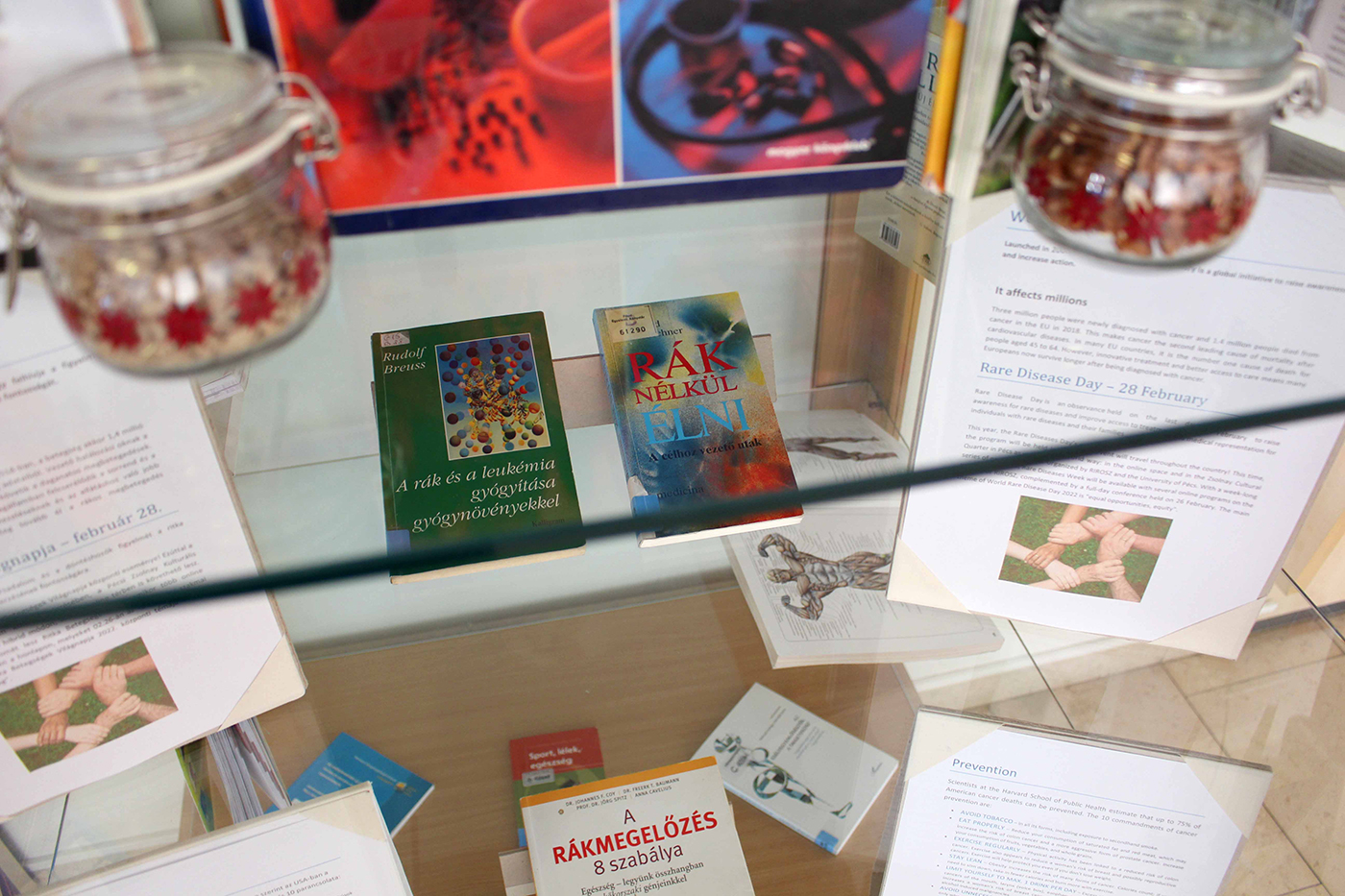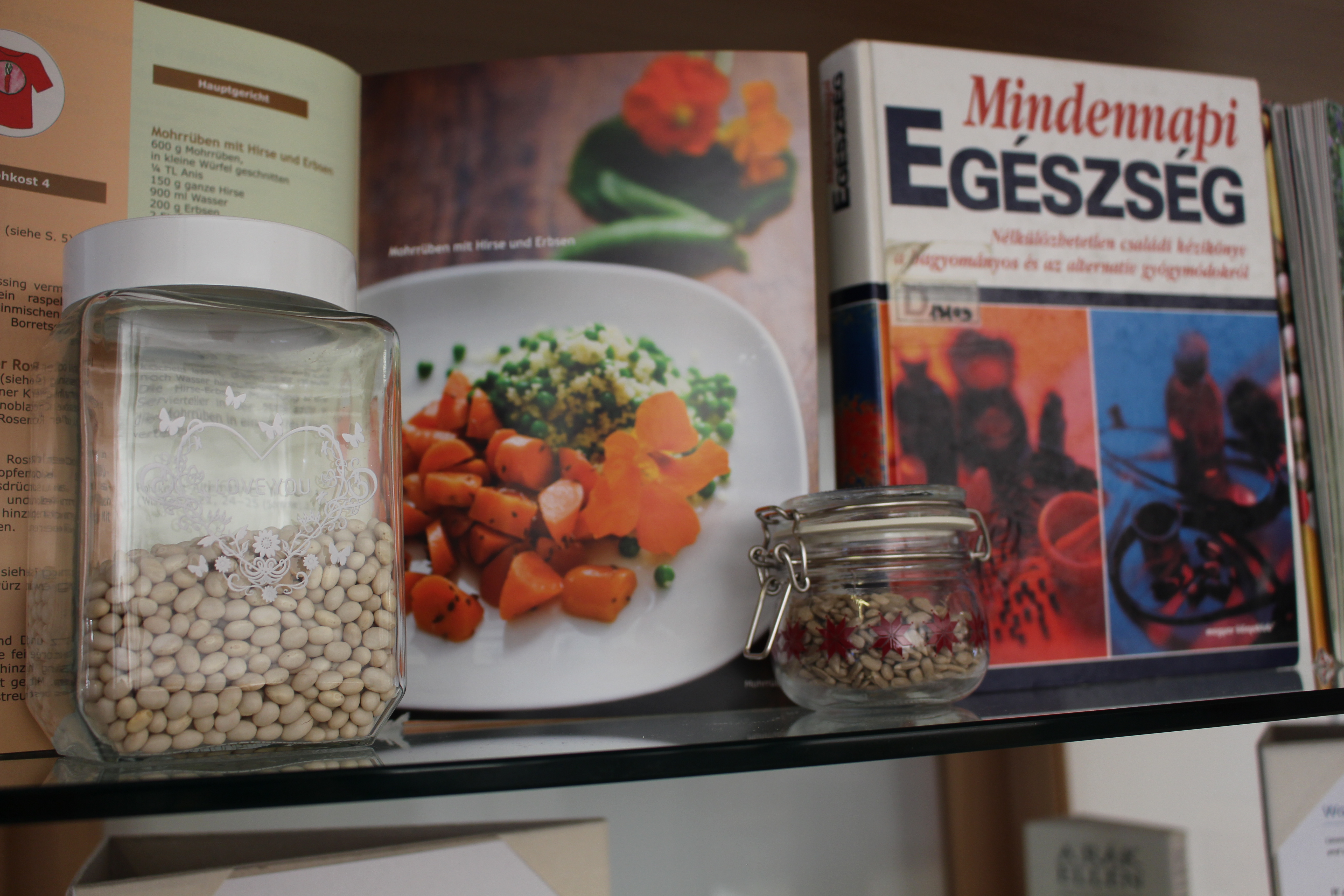Vitrine exhibition – World Cancer Day and Rare Disease Day

Launched in 2000, World Cancer Day on 4 February is a global initiative to raise awareness and increase action.
It affects millions
Three million people were newly diagnosed with cancer and 1.4 million people died from cancer in the EU in 2018. This makes cancer the second leading cause of mortality after cardiovascular diseases. In many EU countries, it is the number one cause of death for people aged 45 to 64. However, innovative treatment and better access to care means many Europeans now survive longer after being diagnosed with cancer.
Rare Disease Day – 28 February
Rare Disease Day is an observance held on the last day of February to raise awareness for rare diseases and improve access to treatment and medical representation for individuals with rare diseases and their families.
This year, the Rare Diseases Day’s main event will travel throughout the country! This time, the program will be held in a hybrid way: in the online space and in the Zsolnay Cultural Quarter in Pécs as well, co-organized by RIROSZ and the University of Pécs. With a week-long series of programs, Rare Diseases Week will be available with several online programs on the website of RIROSZ, complemented by a full-day conference held on 26 February. The main theme of World Rare Disease Day 2022 is "equal opportunities, equity".
Prevention 
Scientists at the Harvard School of Public Health estimate that up to 75% of American cancer deaths can be prevented. The 10 commandments of cancer prevention are:
- - AVOID TOBACCO – in all its forms, including exposure to secondhand smoke.
- - EAT PROPERLY – Reduce your consumption of saturated fat and red meat, which may increase the risk of colon cancer and a more aggressive form of prostate cancer. Increase your consumption of fruits, vegetables, and whole grains.
- - EXERCISE REGULARLY – Physical activity has been linked to a reduced risk of colon cancer. Exercise also appears to reduce a woman's risk of breast and possibly reproductive cancers. Exercise will help protect you even if you don't lose weight.
- - STAY LEAN – Obesity increases the risk of many forms of cancer. Calories count; if you need to slim down, take in fewer calories and burn more with exercise.
- - LIMIT YOURSELF TO MAX. 1 DRINK PER DAY – Excess alcohol increases the risk of cancers of the mouth, larynx (voice box), esophagus (food pipe), liver, and colon; it also increases a woman's risk of breast cancer. Smoking further increases the risk of many alcohol-induced malignancies.
- - AVOID UNNECESSARY EXPOSURE TO RADIATION – Get medical imaging studies only when you need them. Check your home for residential radon, which increases the risk of lung cancer. Protect yourself from ultraviolet radiation in sunlight, which increases the risk of melanomas and other skin cancers.
- - AVOID EXPOSURE TO INDUSTRIAL AND ENVIRONMENTAL TOXINS – Such as asbestos fibers, benzene, aromatic amines, and polychlorinated biphenyls (PCBs).
- - AVOID INFECTIONS including hepatitis viruses, HIV, and the human papillomavirus. Many are transmitted sexually or through contaminated needles.
- MAKE QUALITY SLEEP A PRIORITY – Admittedly, the evidence linking sleep to cancer is not strong. But poor and insufficient sleep increases is associated with weight gain, which is a cancer risk factor.
- - GET ENOUGH VITAMIN D – Many experts now recommend 800 to 1,000 IU a day, a goal that's nearly impossible to attain without taking a supplement. Although protection is far from proven, evidence suggests that vitamin D may help reduce the risk of prostate cancer, colon cancer, and other malignancies. But don't count on other supplements.
https://www.europarl.europa.eu I https://www.health.harvard.edu I https://en.wikipedia.org/wiki/Rare_Disease_Day I https://ritkanap.rirosz.hu
Location: Pécs, Universitas street 2/a, Ground floor, next to Registration
Photo: Szemes-Révész Enikő Evelin
Idea and collection: Pató Diána
Arrangement: Pató Diána, Szemes-Révész Enikő Evelin, Gergely Zsuzsanna